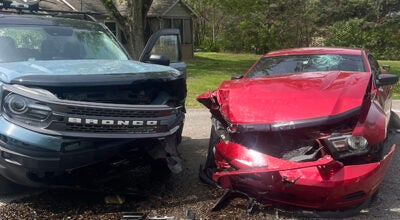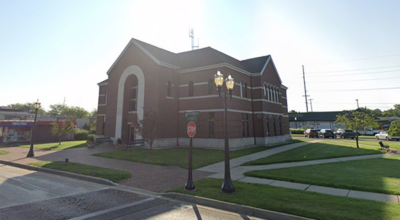Local college students investigating cold cases
Published 8:00 am Thursday, January 7, 2016

Cass County Prosecutor Victor Fitz swears in, from left, Abbi Guyott, Ann Lim, Stephanie Rich, Nick Mathias, Shannon Gonzalez, Julie Sisk, Calvin Gillings and Tyler Fye. (Submitted photo)
Southwestern Michigan College students are stepping up to seek justice in a disturbing number of unsolved Michigan murders.
They have undergone screening, background checks and even training from law enforcement and prosecution experts.
And now they are pitching in to address an often-overlooked tragedy in the state — since the 1970s, Michigan has accrued more than 11,000 unsolved cold-case homicides.
In 2014 the Prosecuting Attorneys Association of Michigan (PAAM) saw a compelling need to explore avenues to address this troubling cold case calamity.
In every instance, a loved one has suffered an untimely and horrific death.
In response, PAAM formed a Cold Case Homicide Committee tasked with finding ways to potentially impact the unsolved numbers.
One of several avenues pursued by the prosecutors association became enlisting college students motivated to achieve justice for long-grieving families.
“Michigan has one of the most challenging ‘murder clearance rates’ in the nation,” said PAAM President Mike Wendling (St. Clair County. “We also have the fewest police officers per capita in the entire Midwest. We are determined to impact this situation.”
To that end, in the summer of 2015, PAAM’s Cold Case Homicide Chair Jerry Jarzynka, along with the association’s immediate past president, Cass County Prosecutor Victor Fitz, engaged SMC and Ferris State University officials regarding the student assist concept.
In particular the conversations included enlisting college student assistance in organizing, tabbing and indexing sometimes daunting volumes of police reports, as well as shaping evidence lists, writing case summaries, preparing draft summaries and scheduling witness interviews.
Students providing a fresh and unfettered reading of the reports was also seen as an advantage.
During discussions, the college officials expressed enthusiasm for a project that would provide criminal justice majors with a real opportunity to learn, as well as to impact public safety.
They also emphasized SMC’s affiliation with Ferris State, allowing students to achieve a four-year degree at the Dowagiac campus and at the same time providing an opportunity for extended assistance in cold case investigations.
As a result of the discussions, project “Seeking Justice” was conceived.
“As former police officers, SMC Chief of Staff Tom Atkinson, SMC Professor Don Ricker and Ferris Professor Mike McCaw have been integral to this effort,” Fitz said. “They are familiar with homicide investigation territory. Their efforts and the overwhelming cooperation of administration and faculty make SMC/Ferris a natural for this pilot project.”
At the beginning of the fall semester, this unique student opportunity was advertised through the SMC Criminal Justice Club.
A large volume of student applications was received.
Finalists were then subjected to a rigorous review and interview process by college staff, prosecutors and law enforcement.
“Objectives include providing criminal justice students with a unique look into real law enforcement matters while at the same time insisting upon the utmost in professionalism from those chosen to assist,” Chief of Staff Atkinson said.
Eight SMC/Ferris students were selected.
On Oct. 30, these academics signed and swore to a confidentiality oath during a formal ceremony at the Cass County Law and Courts Building in Cassopolis.
The first class of “Seeking Justice” students includes: Abbi Guyott (Edwardsburg), Ann Lim (Holland), Nicholas Mathias (Niles), Julie Sisk (Niles), Stephanie Rich (Berrien Springs), Shannon Gonzalez (Eau Claire), Calvin Gillings (Niles) and Tyler Fye (Stevensville).
Guyott led a 2015 SMC Criminal Justice Club that placed first in Michigan’s College Crime Scene Investigation Competition.
The team then went on to national competition, placing eighth in the country.
Fye is vice president of SMC’s Criminal Justice Club.
Sisk is also a reserve police officer for the Niles City Police Department.
“A fresh, enthusiastic set of eyes looking at a well-worn police report can be a real advantage,” said Tim Kozal, a former long-time Kalamazoo major case detective and current Edwardsburg Police Chief. “I vividly recall several years ago in Kalamazoo, a college intern assisting us in the review of police reports in a long-unsolved case. He caught something we had missed. It actually solved the case, assisted in securing a murder conviction and brought the comfort of justice to a pained surviving mother. Student involvement in that case was worth its weight in gold.”
On Nov. 5, SMC/Ferris students attended a day-long course at the Michigan State Police Training Academy hosted by PAAM.
At the Lansing training, SMC/Ferris students mingled with real homicide investigators, detectives and prosecutors while learning investigation strategies, theories, techniques and organizational principles.
The students benefited from notable presenters, including Kent County Prosecutor William Forsyth; Kent County Assistant Prosecutor Kellee Koncki; First Assistant Attorney General-Criminal Division Donna Pendergast; Michigan State Police-Mattawan Det. 1st Lt. Chuck Christensen; Emmet County Chief Assistant Prosecutor Stuart Fenton; and former Kalamazoo Police Commander Mike Wierkema.
Pendergast provided insight into a number of cold case prosecution successes, including serial killer Coral Eugene Watts, as well as the Duvall brothers, who beat two deer hunters to death near Mio in 1985.
“Seeking Justice” students also learned about the use of investigative subpoenas to solve cold case homicides. The investigative subpoena process, signed into Michigan law in 1995, has been credited with solving cases around Michigan, including approximately 20 Kent County homicides.
Several “Seeking Justice” students have already been assigned to provide support to prosecutors and police on an actual cold case investigation. The remainder will receive assignments in early 2016.
“We are optimistic that this project will be of considerable benefit to law enforcement, students and victimized families,” Fitz said.
About Southwestern Michigan College
Southwestern Michigan College is a public, residential and commuter, community college, founded in 1964. The college averages in the top 10 percent nationally for student academic success based upon the National Community College Benchmark Project. Southwestern Michigan College strives to be the college of first choice, to provide the programs and services to meet the needs of students, and to serve our community. The college is accredited by The Higher Learning Commission of the North Central Association of Colleges and Schools and is a member of the American Association of Community Colleges.






